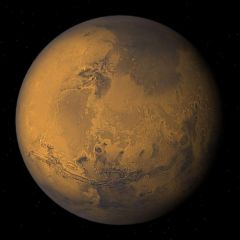Difference between revisions of "Mars"
(Added content for Orbiter 2010P1.) |
(Added table line item.) |
||
| Line 123: | Line 123: | ||
|- | |- | ||
!Add-on!!Source!!Version!!Author!!Type!!Release Date!!Compatibility!!Wiki article | !Add-on!!Source!!Version!!Author!!Type!!Release Date!!Compatibility!!Wiki article | ||
| + | |- | ||
| + | |[https://www.orbiter-forum.com/resources/celestial-bodies-motion-part-1-4-v2-0-0.132/ Celestial Bodies Motion - Part 1/4 - v2.0.0]||O-F Resources||v2.0.0||cristiapi||Scenery||2 July 2015||*module only|| | ||
|- | |- | ||
|[https://www.orbiter-forum.com/resources/orbiter-2010-p1.5428/ Orbiter 2010-P1]||O-F Resources||100830||martins||Orbiter Download||30 August 2010||Orbiter 2010-P1|| | |[https://www.orbiter-forum.com/resources/orbiter-2010-p1.5428/ Orbiter 2010-P1]||O-F Resources||100830||martins||Orbiter Download||30 August 2010||Orbiter 2010-P1|| | ||
Revision as of 13:43, 10 November 2024
 | This article, about a planet, is a stub. You can help Orbiterwiki by expanding it.
Mars is the fourth planet from the sun and the second smallest planet, larger than only Mercury. Its characteristic red color is due to the iron oxide on its surface. Mars is a terrestrial planet with a very thin atmosphere, its surface features are impact craters, valley, deserts, as well at polar ice caps. The days on Mars are just a bit longer than the Earth's as the rotation period and obliquity are similar, and its orbital period is roughly twice as long. Physical characteristicsThe diameter of Mars is roughly half that of the Earth, and is less dense, with a surface gravity of about 0.38 G. As a result of the Late Heavy Bombardment, more than half of the surface of Mars contains craters. The remaining surface consists of deserts, volcanoes, and two polar ice caps consisting of mostly water ice and CO2 ice. The atmospheric pressure is about 1% that of the Earth at sea level, and consists of mostly carbon dioxide, argon, and nitrogen with just a trace of oxygen and water, along with dust.
Rotation and orbitThe semimajor axis of Mars is about 228 million kilometers (143 million miles) and its orbital period is about 687 earth days or 670 Mars sols, orbital inclination is 1.85° from the ecliptic, and orbital eccentricity is about 0.093, one of the highest in the solar system. Mars' sol (day) is a bit longer than that of the earth, about 24½ hours, it's axial tilt is about 25°, similar to the Earth. Mars has two moons, Phobos and Deimos, very small bodies, which may be captured asteroids. Phobos revolves around Mars in just 11 hours, where Deimos orbits in about 30 hours. Mars in OrbiterMars has been a part of Orbiter since the earliest version, Orbiter 2001. In Orbiter 2001, the orbital motion of Mars was defined in the Mars.cfg file. From Orbiter 2002 onward, it has been defined in the Vsop87.dll file. OlympusThe stock Orbiter2016 includes Olympus base, located at 135.43°W, 12.74° N, with three pads and a VOR transmitter. Orbiter versions and add-ons
Natural satellitesSee also
| |||||||||||||||||||||||||||||||||||||||||||||||||||||||||||||||||||||||||||||||||||||||||||||||||||||||||||||||||








